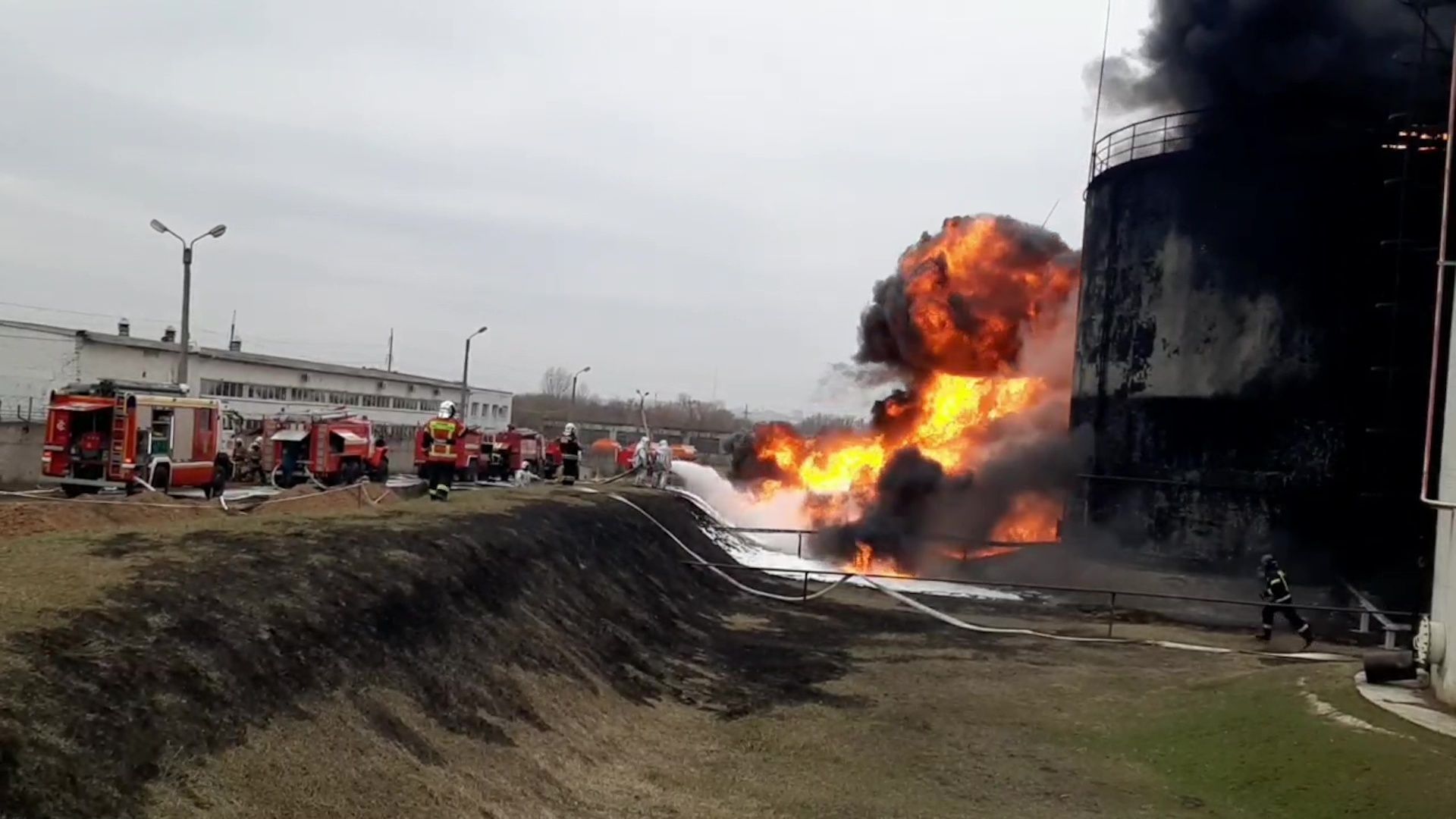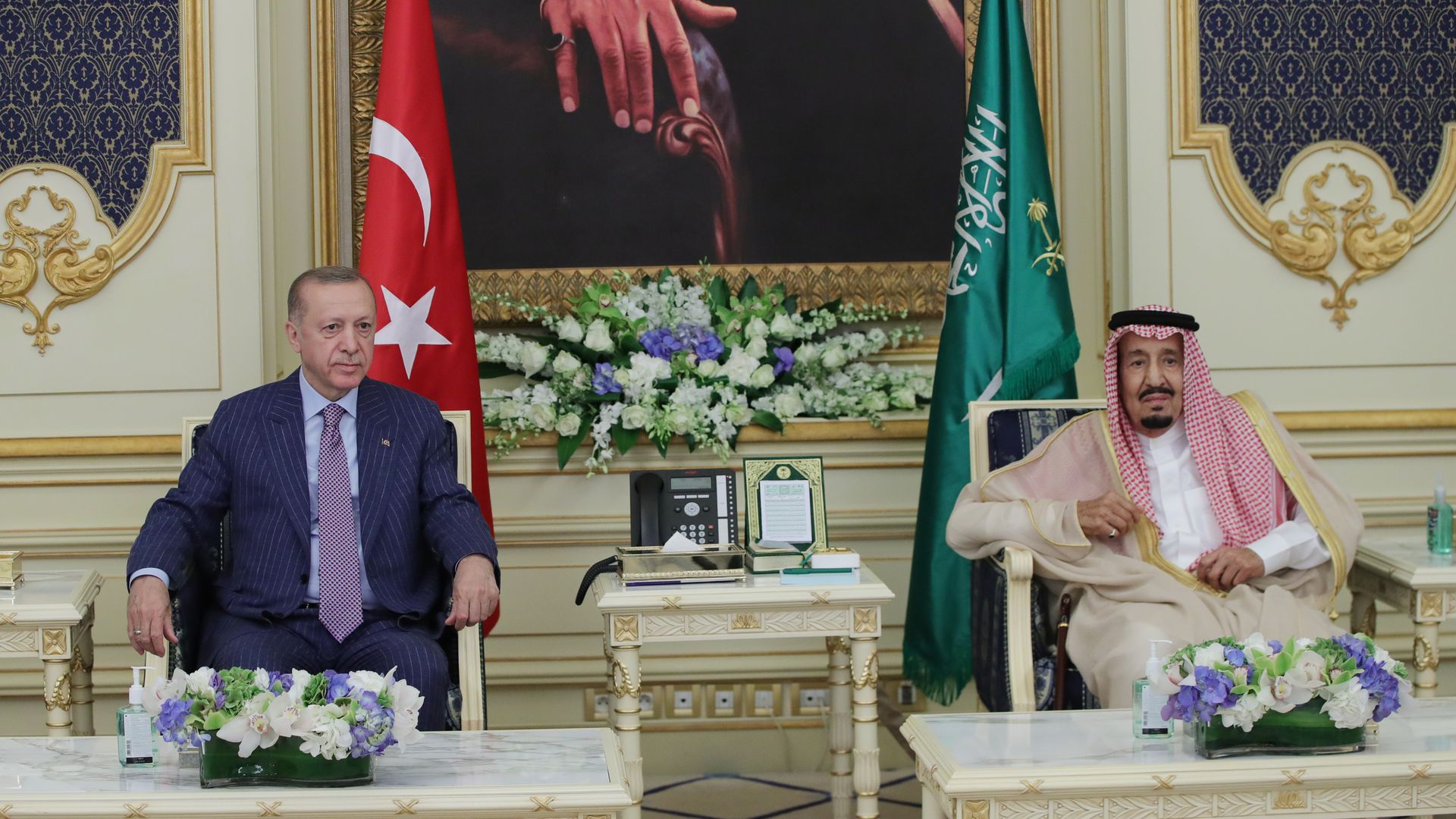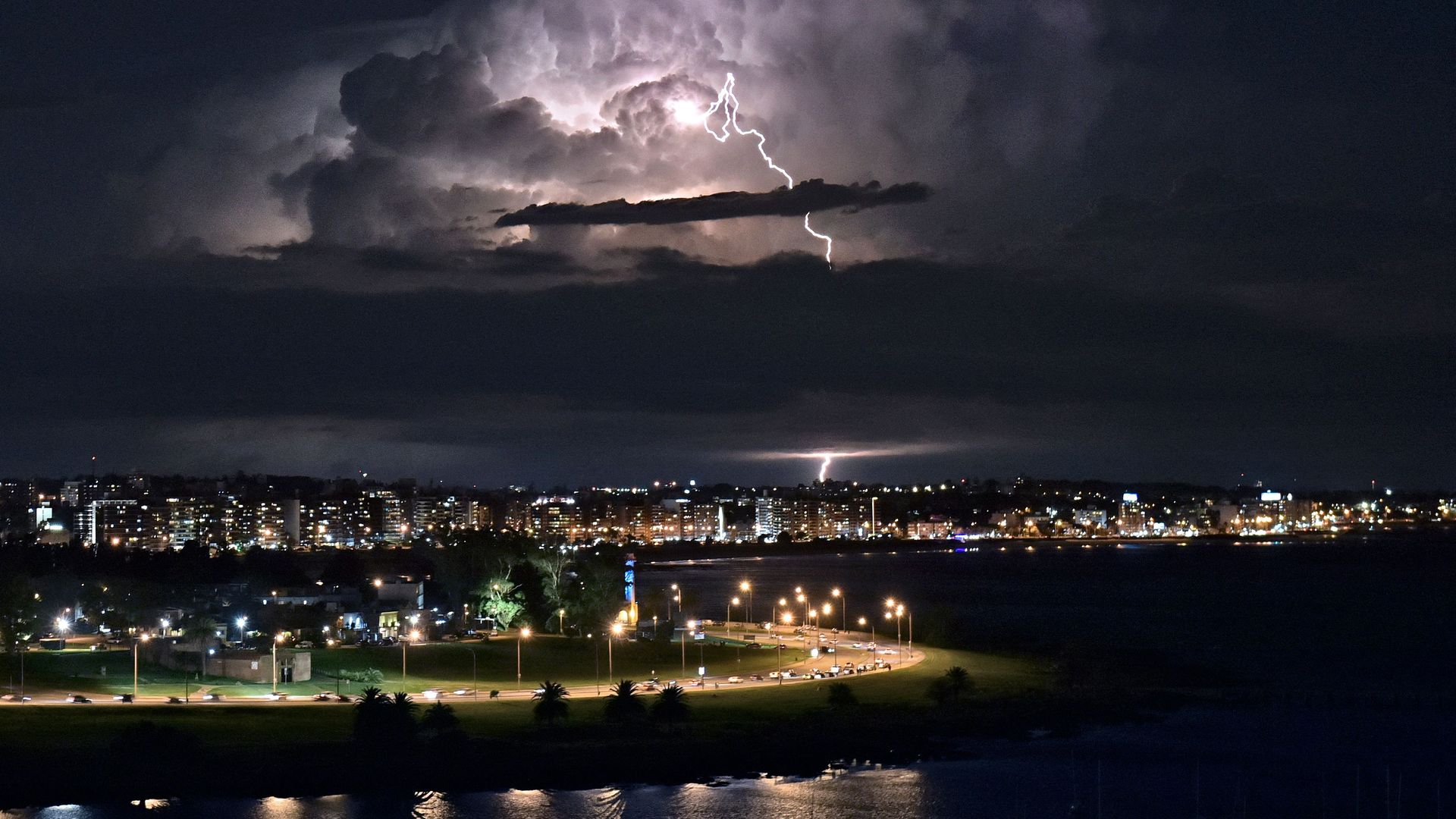| | | | | | | Presented By Kroger | | | | Axios World | | By Dave Lawler · Apr 28, 2022 | | Welcome back to Axios World. - In tonight's edition (1,808 words, 7 minutes), we focus on ways the war in Ukraine could still escalate, before making stops in Colombia, Sri Lanka and Saudi Arabia.
New arrival? Subscribe. | | | | | | 1 big thing: U.S. push for Ukraine "win" raises stakes for Russia |  | | | A Ukrainian soldier on the front lines near Kharkiv. Photo: Fadel Senna/AFP via Getty Images | | | | President Biden's request today for an additional $20 billion in military assistance was intended to equip Ukraine for the next five months of war. It's part of a broader mission to ensure "they have what they need to win this war," an administration official told reporters. The other side: As Western assistance and ambitions grow, the Kremlin and its state media mouthpieces are increasingly framing the "special operation" in the Donbas as an existential battle against NATO — and signaling that they'd prefer to dramatically escalate, rather than lose it. State of play: With peace talks stalled, and a broader array of weaponry flowing into Ukraine, some Western officials are now openly pinning their hopes on a Ukrainian battlefield victory. - U.K. Foreign Secretary Liz Truss promised Wednesday to "keep going further and faster to push Russia out of the whole of Ukraine."
- That would require Kyiv not only to block the current Russian advance but to push Russia out of the Donbas and even Crimea (the latter doesn't currently appear to be in Kyiv's sights).
- Her remarks followed Defense Secretary Lloyd Austin's pronouncement that the U.S. wants "to see Russia weakened to a degree that it can't do the kinds of things it has done in invading Ukraine." Austin too said Ukraine could win the war "with the right equipment."
Yes, but: Some European allies are being far more cautious. (Germany's belated promise of heavy weaponry for Ukraine notwithstanding.) - One European official told Axios that while more help for Ukraine is imperative, everything must also be done to preserve the possibility of a diplomatic solution.
While Putin has shown no interest in off-ramps, it's currently difficult to envision this war ending either in Moscow's outright victory or surrender. - Even if Russia continues to make territorial gains, the war won't necessarily end if and when Moscow declares victory in Donbas, notes Michael Kofman, a top expert on the Russian military at CNA.
- "The correlation of forces is going to steadily shift toward Ukraine's favor" as Western arms continue to flow in and Russia's military exhausts its own offensive capabilities, he says.
If Putin begins to believe he's losing the war at "peacetime strength," Kofman says, "he may have to declare a real state of war and enact national mobilization." - Jack Watling and Nick Reynolds from the Royal United Services Institute, a British think tank, argue in a new report that Putin is likely to do just that, perhaps during Victory Day commemorations on May 9.
- That could provide hundreds of thousands of fresh troops who will need training but could certainly prolong the war.
Russian officials have been emphasizing that they are not only fighting Ukraine, but all of NATO. - Foreign Minister Sergei Lavrov said Monday that in such a "proxy" conflict, the risk of nuclear war "should not be underestimated."
- Putin himself warned Wednesday that outside actors who "create strategic threats for Russia" will face "lightning-fast" retaliation.
- One Pentagon concern is that Russia could strike Western arms shipments to Ukraine, potentially on NATO soil.
The shift has been particularly notable on state TV. - RT chief Margarita Simonyan said that if it were a choice between losing in Ukraine or starting World War III, "I think World War III is more realistic, knowing us, knowing our leader Vladimir Vladimirovich Putin."
- Even nuclear war is more likely than defeat in Ukraine, she added, to which host Vladimir Solovyov replied, "But we will go to heaven, and they will simply croak."
The bottom line: As Mike Mazarr of RAND notes, it's going to become increasingly difficult for the U.S. and NATO to maintain the "balancing act" of giving Ukraine the tools to win "without courting a larger war." |     | | | | | | Part II: Explosions inside Russia |  | | | A fire at a fuel depot in the Russian city of Belgorod. Photo: Russian government handout via Getty | | | | The war already seems to have expanded beyond Ukraine's borders, if only slightly. The latest: Three separate explosions were reported Wednesday at military storage depots on Russian soil, following fires on Monday at two oil storage facilities near the border. - Footage shared on social media of one of those earlier explosions suggested it was likely an "air or missile strike," military analyst Rob Lee tweeted. Other fires at sensitive facilities farther from the border are more mysterious still, perhaps resulting from accidents or sabotage.
- While Russia has not blamed Kyiv for any of the explosions, state media reported this week that a Ukrainian drone had been shot down over Russian territory.
- Ukraine has also not directly claimed responsibility, but Mykhailo Podolyak, one of President Volodymyr Zelensky's top advisers, tweeted that it must be "karma."
Asked how the U.S. would view Ukrainian attacks inside Russia, Secretary of State Tony Blinken told a Senate committee on Wednesday that it was up to Ukraine to use all tactics it deemed "necessary to defend against Russian aggression." - Podolyak quickly trumpeted Blinken's remark and said, "Ukraine will defend itself in any way, including strikes on the warehouses and bases of the killers."
- U.K. Defense Secretary Ben Wallace also said Ukrainian strikes on military targets inside Russia would be "legitimate under international law," but hinted at fear of Russian retaliation by noting that such strikes were unlikely to be carried out using British-supplied weapons.
- Asked about whether the U.S. would support Ukrainian strikes on Russian soil, White House press secretary Jen Psaki did not answer directly but noted, "we're talking about consideration of military targets," not civilian infrastructure.
|     | | | | | | Part III: Tremors in Transnistria |  Data: Institute for the Study of War; Map: Jared Whalen/Axios. NOTE: On the above map, Transnistria is the narrow strip (inside Moldova) between Ukraine's southwestern border and the Dniester River. Authorities in Transnistria reported explosions this week at sites including state security headquarters and radio towers used to broadcast Russian-language news. The big picture: Transnistria, a breakaway republic that governs a narrow strip of territory on the border with Ukraine, is an international anomaly dating to the breakup of the Soviet Union. It is aligned with Russia and hosts 1,500 Russian troops, but it's internationally recognized as part of Moldova and uses some Moldovan public services. - After the explosions, the separatist government accused Ukrainian saboteurs, Ukraine accused Russia of a false flag operation, Moldova blamed "pro-war forces" within Transnistria, and the Pentagon admitted that it didn't know who was responsible.
- Moldova, which has a tiny army, a pro-EU government and an acute reliance on Russia, particularly for energy, is concerned.
- "We condemn any challenges and attempts to lure the Republic of Moldova into actions that could jeopardize peace in the country," President Maia Sandu said Tuesday. She also accused Russia of using various means to try to destabilize Moldova.
The backdrop: This all happened days after a Russian general said Russia aimed to take all of southern Ukraine to link up with Transnistria. That doesn't currently look militarily feasible, but as the war continues, the situation in Transnistria will bear watching. More headlines: |     | | | | | | A message from Kroger | | Life at Kroger: people matter | | |  | | | | At Kroger, we take seriously our role as one of America's largest employers. Since 2018, we've invested more than $4.5 billion in wage increases, training, pensions, and health care benefits for our associates. Learn more about the opportunities made possible by the Kroger Family of Companies. | | | | | | Bonus: Where in the world? | | When you think of the 10 countries I'm looking for here, you probably think of one very big city. But if I give you the second-most populous city, can you give me the country? - Birmingham
- Cordoba
- Hamhung
- Kano
- Marseille
- Mashhad
- Surabaya
- Thessaloniki
- Tijuana
- Yokohama
Scroll to the bottom for the answers. |     | | | | | | 4. Global news roundup |  | | | Holocaust survivors take part in the March of the Living today at the former Auschwitz-Birkenau camp. Photo: Wojtek Radwansk/AFP via Getty | | | | 1. A retired general and nine other former military officials in Colombia admitted their roles in the slayings of more than 120 civilians in an emotional truth and reconciliation-style hearing on Wednesday. - The ex-soldiers testified that they promised jobs to poor peasants, murdered them and then recorded their deaths as combat killings in order to please their superiors.
- Context: The court hearings are part of the peace process agreed to with the FARC rebels in 2016. The former soldiers will not receive prison sentences.
2. Sri Lanka's trade unions called a general strike today amid a severe economic downturn. The country is effectively bankrupt and shortages of key supplies like medicine are getting worse. - President Gotabaya Rajapaksa has clung to power and turned to international lenders for help. The World Bank is set to provide $600 million, per Bloomberg, and the government is also in talks with China, India and the IMF.
3. A Myanmar military court sentenced Aung San Suu Kyi to five years in prison on Wednesday in the first of 11 corruption cases launched against her by the junta since it ousted her in a February 2021 coup. 4. Mexican moms tired of government inaction have taken on searching for their missing loved ones, even as that increasingly places them in danger, Axios Latino author Marina E. Franco reports. - Mexico has nearly 100,000 disappeared and missing people, government data shows. A UN report found that government officials and criminal groups are responsible in most cases.
5. The new government in Seoul and the relatively new one in Tokyo are trying to reset relations, WSJ reports. - Why it matters: Long-running tensions between the two U.S. allies have been a continual source of frustration in Washington, but Prime Minister Fumio Kishida told South Korean lawmakers this week that "with the rule-based international order under threat, there has never been a more vital time for cooperation."
- We'll see how long it lasts.
|     | | | | | | 5. Data du jour: Catholicism declines in Latin America |  Data: Latinobarómetro; Chart: Thomas Oide/Axios Catholicism is losing its grip in Latin America as the percentage of people who say they identify as evangelical has grown, Marina writes. - That decline has political implications. For example, several countries have recently decriminalized abortion, recognized gay marriage and pushed for transgender rights.
Yes, but: Evangelical faiths have grown. In Brazil, the number of survey respondents who identified as evangelical went from 3% in 2000 to 18% in 2010 and 22% in 2020. Go deeper. |     | | | | | | 6. One to watch: Erdoğan in Saudi Arabia to mend relations |  | | | Turkish President Recep Tayyip Erdoğan (L) meets Saudi King Salman today in Jeddah. Photo: Murat Kula/Anadolu Agency via Getty | | | | Turkish President Recep Tayyip Erdoğan arrived in Saudi Arabia today as part of an effort to reset relations and bolster Turkey's struggling economy. The big picture: After years of tensions over various regional conflicts, relations broke down almost entirely in 2018 over the murder of Washington Post columnist Jamal Khashoggi in the Saudi Consulate in Istanbul, Axios' Barak Ravid writes. - Ankara exposed key intelligence about the murder, and Erdoğan claimed the order to kill Khashoggi "came from the highest levels."
- But a Turkish court earlier this month suspended legal proceedings against 26 Saudi nationals who were allegedly involved in the murder, in a transparent attempt to repair relations.
- Erdoğan has also been mending ties with the UAE, Egypt and Israel, outreach that analysts believe is tied to Turkey's economic troubles.
|     | | | | | | 7. Stories we're watching |  | | | Lightning strikes over Montevideo, Uruguay. Photo: Mariana Suarez/AFP via Getty | | | - Russia releases former Marine Trevor Reed
- Ambassador accused of illegal foreign lobbying
- 55 countries sign declaration for internet freedom
- Dangerous heat wave in India and Pakistan
- U.S. not shutting door on possible Iran nuclear deal
- Measles cases surge 79% after pandemic disruptions
- Beijing braces for lockdown with mass testing, panic buying
Quoted: "I imagined my family in one of those houses that is now destroyed and black. I see my granddaughters running away in panic, part of the family eventually killed. So, the war is an absurdity in the 21st century. The war is evil." — UN Secretary-General António Guterres today in Borodyanka, Ukraine |     | | | | | | A message from Kroger | | Investing in our associates | | |  | | | | At Kroger, our priority is to invest in our associates. Our average hourly compensation is over $22 when factoring in generous benefits like affordable health care, 401(k) plans and pensions. Learn more about the opportunities made possible by the Kroger Family of Companies. | | | | Answers: 1. U.K.; 2. Argentina; 3. North Korea; 4. Nigeria; 5. France; 6. Iran; 7. Indonesia; 8. Greece; 9. Mexico; 10. Japan Clues: 1. Birmingham; 2. Cordoba; 3. Hamhung; 4. Kano; 5. Marseille; 6. Mashhad; 7. Surabaya; 8. Thessaloniki; 9. Tijuana; 10. Yokohama |  | It's called Smart Brevity®. Over 200 orgs use it — in a tool called Axios HQ — to drive productivity with clearer workplace communications. | | | | | | Axios thanks our partners for supporting our newsletters. If you're interested in advertising, learn more here.
Sponsorship has no influence on editorial content. Axios, 3100 Clarendon Blvd, Suite 1300, Arlington VA 22201 | | | You received this email because you signed up for newsletters from Axios.
Change your preferences or unsubscribe here. | | | Was this email forwarded to you?
Sign up now to get Axios in your inbox. | | | | Follow Axios on social media:    | | | | | |











No comments:
Post a Comment